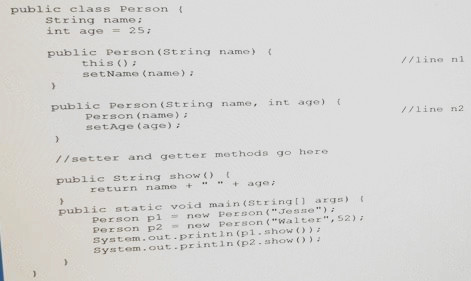Question 6
Given the code fragment:
public class Foo {
public static void main (String [ ] args) {
Map<Integer, String> unsortMap = new HashMap< > ( );
unsortMap.put (10, "z");
unsortMap.put (5, "b");
unsortMap.put (1, "d");
unsortMap.put (7, "e");
unsortMap.put (50, "j");
Map<Integer, String> treeMap = new TreeMap <Integer, String> (new
Comparator<Integer> ( ) {
@Override public int compare (Integer o1, Integer o2) {return o2.compareTo (o2); } } ); treeMap.putAll (unsortMap); for (Map.Entry<Integer, String> entry : treeMap.entrySet () ) { System.out.print (entry.getValue () + " ");
}
}
}
What is the result?
public class Foo {
public static void main (String [ ] args) {
Map<Integer, String> unsortMap = new HashMap< > ( );
unsortMap.put (10, "z");
unsortMap.put (5, "b");
unsortMap.put (1, "d");
unsortMap.put (7, "e");
unsortMap.put (50, "j");
Map<Integer, String> treeMap = new TreeMap <Integer, String> (new
Comparator<Integer> ( ) {
@Override public int compare (Integer o1, Integer o2) {return o2.compareTo (o2); } } ); treeMap.putAll (unsortMap); for (Map.Entry<Integer, String> entry : treeMap.entrySet () ) { System.out.print (entry.getValue () + " ");
}
}
}
What is the result?
Question 7
Given the code fragment:
String str = "Java is a programming language";
ToIntFunction<String> indexVal = str: : indexOf; //line n1
int x = indexVal.applyAsInt("Java"); //line n2
System.out.println(x);
What is the result?
String str = "Java is a programming language";
ToIntFunction<String> indexVal = str: : indexOf; //line n1
int x = indexVal.applyAsInt("Java"); //line n2
System.out.println(x);
What is the result?
Question 8
Given the code fragment:

What is the result?

What is the result?
Question 9
Given:
class UserException extends Exception { }
class AgeOutOfLimitException extends UserException { }
and the code fragment:
class App {
public void doRegister(String name, int age)
throws UserException, AgeOutOfLimitException {
if (name.length () <= 60) {
throw new UserException ();
} else if (age > 60) {
throw new AgeOutOfLimitException ();
} else {
System.out.println("User is registered.");
}
}
public static void main(String[ ] args) throws UserException {
App t = new App ();
t.doRegister("Mathew", 60);
}
}
What is the result?
class UserException extends Exception { }
class AgeOutOfLimitException extends UserException { }
and the code fragment:
class App {
public void doRegister(String name, int age)
throws UserException, AgeOutOfLimitException {
if (name.length () <= 60) {
throw new UserException ();
} else if (age > 60) {
throw new AgeOutOfLimitException ();
} else {
System.out.println("User is registered.");
}
}
public static void main(String[ ] args) throws UserException {
App t = new App ();
t.doRegister("Mathew", 60);
}
}
What is the result?
Question 10
Given the code fragment:

What is the result?

What is the result?

